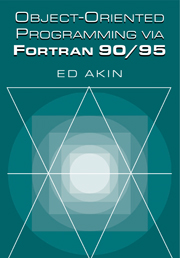Book contents
- Frontmatter
- Contents
- Preface
- One Program Design
- Two Data Types
- Three Object-Oriented Programming Concepts
- Four Features of Programming Languages
- Five Object-Oriented Methods
- Six Inheritance and Polymorphism
- Seven OO Data Structures
- Eight Arrays and Matrices
- Nine Advanced Topics
- Appendix A Fortran 90 Overview
- Appendix B Selected Exercise Solutions
- Appendix C Companion C++ Examples
- Bibliography
- Glossary of Object-Oriented Terms
- Index
One - Program Design
Published online by Cambridge University Press: 15 October 2009
- Frontmatter
- Contents
- Preface
- One Program Design
- Two Data Types
- Three Object-Oriented Programming Concepts
- Four Features of Programming Languages
- Five Object-Oriented Methods
- Six Inheritance and Polymorphism
- Seven OO Data Structures
- Eight Arrays and Matrices
- Nine Advanced Topics
- Appendix A Fortran 90 Overview
- Appendix B Selected Exercise Solutions
- Appendix C Companion C++ Examples
- Bibliography
- Glossary of Object-Oriented Terms
- Index
Summary
Introduction
The programming process is similar in approach and creativity to writing a paper. In composition, you are writing to express ideas; in programming, you are expressing a computation. Both the programmer and the writer must adhere to the syntactic rules (grammar) of a particular language. In prose, the fundamental idea-expressing unit is the sentence; in programming, two units – statements and comments – are available.
Composition, from technical prose to fiction, should be organized broadly, usually through an outline. The outline should be expanded as the detail is elaborated and the whole reexamined and reorganized when structural or creative flaws arise. Once the outline settles, you begin the actual composition process using sentences to weave the fabric your outline expresses. Clarity in writing occurs when your sentences, both internally and globally, communicate the outline succinctly and clearly. We stress this approach here with the aim of developing a programming style that produces efficient programs humans can easily understand.
To a great degree, no matter which language you choose for your composition, the idea can be expressed with the same degree of clarity. Some subtleties can be better expressed in one language than another, but the fundamental reason for choosing your language is your audience: people do not know many languages, and if you want to address the American population, you had better choose English over Swahili.
- Type
- Chapter
- Information
- Object-Oriented Programming via Fortran 90/95 , pp. 1 - 25Publisher: Cambridge University PressPrint publication year: 2003



